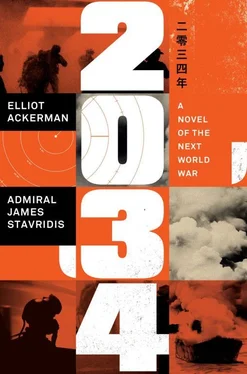As improbably as he had arrived, Minister Chiang was gone.
5

On Death Ground
02:38 July 01, 2034 (GMT+8)
South China Sea
From the nose cone rearward, his eyes ran the line of the fuselage. He ducked under the flared wings and walked in a crouch to each of their tips, brushing their leading edge with the pads of his four fingers as he checked for a dent, a loose coupling, any compromise in their aerodynamics. He made his way back to the dark, gaping exhaust of the twin engines. He stuck his head inside each afterburner, inhaled deeply, and shut his eyes. God, how he loved that smell: jet fuel. Next, in a single leap, like a house cat assuming its perch on a favorite windowsill, he hoisted himself onto the back of the Hornet. Wedge walked forward to the open cockpit and sat inside. He placed one hand on the inert throttle, the other on the stick, leaned against the headrest, and shut his eyes.
It was the middle of the night and the hangar deck was empty. Wedge had arrived on the Enterprise only a few hours before, after a brief layover in Yokosuka. On the flight in he observed the sun setting with a particular brilliance in the west, in the direction of Zhanjiang. It was the reddest he’d ever seen—red like a wound. He could think of no other way to describe this, his first glimpse of nuclear fallout. Although the strike had only used a tactical nuke, it was a significant escalation and the possibility of a strategic attack was on the rise. The Indians were making noises about trying to negotiate some kind of ceasefire, but that wasn’t going anywhere. Wedge hardly considered himself a strategist, but he knew enough to understand that a single miscalculation on either side could take this whole war high-order nuclear—that meant the big stuff, the end-of-days stuff.
What a goat fuck, Wedge thought to himself.
Followed by, Pop-Pop would’ve loved this.
The jet lag had eventually brought him down to the hangar deck, to check out the aircraft assigned to his new command, VMFA-323, the Death Rattlers. Even without the time change, the excitement of this assignment would have likely kept him up. After the chance meeting at the officers’ club in Miramar with the Death Rattlers’ old colonel, he’d had the idea to call the master sergeant who’d played chaperone to him while he was in Quantico. When Wedge asked whether the air wing had assigned another officer to take over the underequipped and understaffed Death Rattlers, the master sergeant explained that the vacancy was low-priority because the Corps’ unchanged policy was to fill vacancies in its F-35 squadrons, not its antiquated Hornet squadrons. At that point their conversation went the same as nearly all of their conversations before (“Nobody’s in command? Are you shitting me?” “Negative, sir.”). With a few deft strokes of his keyboard and a phone call to a soon-to-retire general, the master sergeant was able to cut Wedge a new set of orders.
How long had he waited for those orders? Really, since he’d been a kid. He had a sense as he sat in the cockpit that his entire life—everything he had ever hoped to be—came down to this assignment. With his eyes shut, he continued to manipulate the Hornet’s controls, juking the stick, stamping the rudder pedals, adding and easing off the throttle, while in his imagination he sequenced through a Split-S, a Low and High Yo-Yo defense, an Immelmann, and High-G Barrel Roll. As a child, he used to make a cockpit out of a cardboard box and wear one of his father’s old flight helmets. He would visualize dogfights, as he did now ( Three-quarters throttle. Even rudder… closing, closing… ), epic battles in which sometimes he was the victor ( Full-throttle, break right! ), and other times he was blown out of the sky ( On your tail! Eject! Eject! ) facing impossible odds. But always there was glory.
When he was ten years old, he’d put his cardboard box cockpit on the top of the stairs. Wearing his prized helmet, he sat inside. He wanted to feel what it was like to fly. His mother told him it wasn’t a good idea, and though she wouldn’t stop him from trying, she refused to be the one to give him the push. So he balanced his box on the lip of the stairs and then he leaned himself forward. The box tipped over the edge. And he flew…
For about five stairs.
Then the front of the box caught the sixth stair. It pitched over, violently. Wedge went face-first into the floor. The crash landing split his lip open. He still had the scar, ever so slight, on the inside of his mouth. He ran the tip of his tongue over it now.
“Can I help you, Major?”
Wedge glanced over the side of the cockpit, to find a senior chief with an unlit cigarette dangling from his mouth. He introduced himself to the senior chief and explained who he was. As he was the new commanding officer of the Death Rattlers, these were, in fact, his planes, so there was nothing to worry about; he could sit where he wanted.
“Your planes, Major?” said the senior chief, gazing out at the Hornets. The ten aircraft were gathered nearest the elevator that led to the flight deck, in the ready position, and crowding out the dozens of F-35s that had proven useless. The senior chief laughed to himself incredulously as he pulled a ladder up to the side of the cockpit. “Your predecessor thought these were his planes too. Admiral Hunt didn’t much appreciate that.”
Wedge had an in-brief with the admiral scheduled sometime in the next week. At the evocation of her name, he chose to listen a bit more closely to the senior chief, who introduced himself only as “Quint” and who Wedge suspected might possess some shred of wisdom to keep him in the good graces of his boss, or at least from meeting the ignominious fate of his predecessor. Quint then powered on the avionics in the cockpit. Any interface with a computer, a GPS, or that could conceivably be accessed online, Quint had disabled. Munitions would be deployed via manual weapons sights and manual releases. Navigation would be performed off charts, with flight times calculated using a wristwatch, pencil, and calculator. Communications would be handled via a custom-installed suite of VHF, UHF, and HF radios. For Wedge, who already knew that his Hornets had undergone some modifications, the tour Quint gave of their streamlined cockpits both under- and overwhelmed him.
It underwhelmed him because—even though he should’ve known better—he couldn’t believe the bare-bones nature of the onboard systems. It overwhelmed him because he couldn’t believe that he would have the chance to fly how they used to fly, before pilots became technicians, which was to say on instinct.
Inadvertently, Wedge succumbed to a heedless smile.
“You all right there, Major?” Quint asked.
Wedge turned toward him, the expression still stamped to his face. “Fine, senior chief. Just fine.” He ran the tip of his tongue on the inside of his lip, tracing the outline of his boyhood scar.

10:37 July 03, 2034 (GMT+2)
Gdańsk Bay
The destruction of the undersea cables was accepted with equanimity, if not a measure of outright enthusiasm, by Farshad’s old colleagues in the Revolutionary Guard Corps. Major General Mohammad Bagheri, chief of staff of the armed forces, was somewhat more taciturn. A dispatch directly from the general arrived on Farshad’s encrypted laptop within hours. It gave a single instruction: Continue to keep us apprised of all developments. Farshad couldn’t help but wonder what the Russians would come up with next.
Читать дальше














